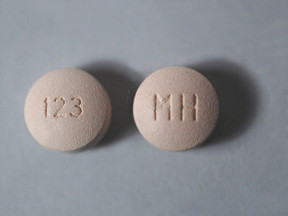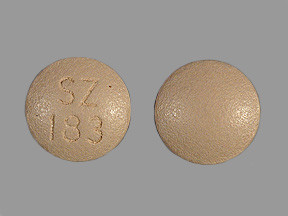ERGOTAMINE/CAFFEINE - ORAL
PHONETIC PRONUNCIATION: (er-GOT-a-meen/KAF-een)
COMMON BRAND NAME(S): Cafergot
GENERIC NAME(S): ergotamine tartrate/caffeine
Uses
USES: This combination medication is used to treat or prevent certain types of headaches (vascular headaches including migraine and cluster headaches). Headache pain can sometimes be caused by widened blood vessels in the head. Ergotamine works by narrowing these widened blood vessels. Caffeine increases the absorption of ergotamine and also narrows widened blood vessels.
How to use ERGOTAMINE/CAFFEINE - ORAL
HOW TO USE: Take this medication by mouth with or without food as directed by your doctor, usually 2 tablets at the first sign of headache, followed by 1 tablet every half hour until the headache is relieved. Do not take more than 6 tablets per headache attack or 10 tablets in a 7-day period. If your doctor has prescribed this medication to help prevent certain types of headaches (such as cluster headaches), take this medication exactly as directed by your doctor, usually for short-term treatment (2 to 3 weeks). The dosage is based on your medical condition and response to treatment. This medication works best if it is taken at the first sign of the headache. If you wait until the headache has worsened, the medication may not work as well. If you have a higher risk for heart problems (see Precautions), your doctor may perform a heart exam before you start taking this medication. He/she may also direct you to take your first dose of this medication in the office/clinic to monitor for serious side effects (such as chest pain). Talk to your doctor for details. This medication is usually taken only as needed. It is not meant for long-term daily use. Though it helps many people, this medication may sometimes cause addiction. This risk may be higher if you have a substance use disorder (such as overuse of or addiction to drugs/alcohol). Take this medication exactly as prescribed to lower the risk of addiction. Ask your doctor or pharmacist for more details. If you are using drugs for migraine attacks on 10 or more days each month, the drugs may actually make your headaches worse (medication overuse headache). Do not use medications more often or for longer than directed. Tell your doctor if you need to use this medication more often, or if the medication is not working as well, or if your headaches get worse.
Side Effects
Precautions
Interactions
Overdose
Images

- color
- beige
- shape
- round
- imprint
- 123, MH
Reviews
Faq for ERGOTAMINE/CAFFEINE - ORAL
Ergotamine/Caffeine is used to treat migraines and cluster headaches.
Ergotamine reduces the blood flow to the brain, which helps to relieve migraines and cluster headaches. Caffeine acts as a vasoconstrictor, helping to improve the absorption of ergotamine.
The common side effects of Ergotamine/Caffeine include nausea, vomiting, dizziness, flushing, slow heartbeat, and muscle pain.
Ergotamine/Caffeine should be taken as directed by your doctor. Usually, one tablet is taken at the first sign of a migraine attack, followed by a second tablet after 30 minutes if needed. Do not exceed the recommended dosage.
Ergotamine/Caffeine may interact with certain medications, including other migraine medications, antidepressants, and certain antibiotics. It is important to inform your doctor about all the medications you are currently taking to avoid potential interactions.
Ergotamine/Caffeine is not recommended for use during pregnancy, as it may harm the unborn baby. It is also not recommended for use while breastfeeding, as it can pass into breast milk and harm the nursing baby.
Ergotamine/Caffeine should not be used by individuals with certain medical conditions, such as uncontrolled high blood pressure, heart disease, liver or kidney problems, or a history of stroke. It should also be avoided in patients with peripheral vascular disease or circulation disorders.
Ergotamine/Caffeine is not recommended for use in children and adolescents under the age of 18, as its safety and effectiveness have not been established in this age group.
If you miss a dose of Ergotamine/Caffeine, take it as soon as you remember. However, if it is close to the time for your next dose, skip the missed dose and resume your regular dosing schedule. Do not take a double dose to make up for a missed one.
Warning
WARNING: This medication has rarely caused a serious lack of blood flow to the arms/hands, or to the feet, or to the brain, which could cause a stroke. The risk is increased when this medication is taken with other drugs that can affect the removal of ergotamine from your body. Examples include boceprevir, mifepristone, telaprevir, telithromycin, certain antidepressants (such as nefazodone), azole antifungals (such as ketoconazole, itraconazole), cobicistat, macrolide antibiotics (such as clarithromycin, erythromycin, troleandomycin), HIV protease inhibitors (such as ritonavir, nelfinavir, indinavir), HIV NNRTIs (such as delavirdine), SSRIs (such as fluoxetine, paroxetine, fluvoxamine), among others.
Disclaimer
IMPORTANT: HOW TO USE THIS INFORMATION: This is a summary and does NOT have all possible information about this product. This information does not assure that this product is safe, effective, or appropriate for you. This information is not individual medical advice and does not substitute for the advice of your health care professional. Always ask your health care professional for complete information about this product and your specific health needs.

No Reviews Yet